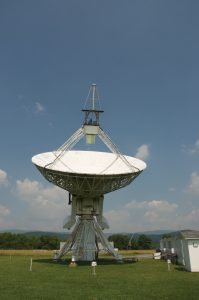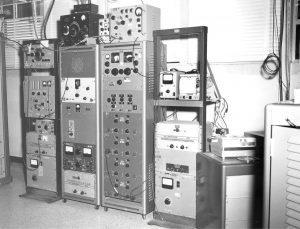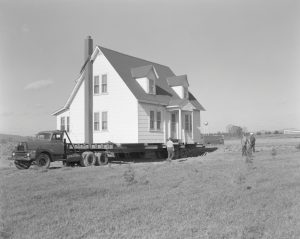The 45-foot telescope in Green Bank, West Virginia watches the Sun all day. A 70-300 MHz mid-frequency-range antenna points outwards on top of the quadropod arms.


Project Ozma Hardware
This equipment was installed in the control room of the 85-foot Howard E. Tatel telescope in Green Bank in 1960. Dr. Frank Drake used it to perform the world’s first search for extraterrestrial intelligence. He called the search Project Ozma, after the fictional queen of Oz. For two months, Drake and his team observed the stars Tau Ceti and Epsilon Eridani, two nearby, Sun-like stars. No signs of ETI were detected.

Moving House in Green Bank
Several farms were purchased in Green Bank to form the NRAO’s first observatory. Instead of being demolished, the houses that were in the way of telescope and building placement were moved to new locations around town and got new owners.

An 85-foot Telescope on the Move
Moving the 85-2 telescope farther along the road separating it from its partner, the 85-1, otherwise known as the Howard E. Tatel Telescope. The two telescopes formed the NRAO’s first array, the Green Bank Interferometer. Changing the distance between the 85-footers changed the resolution of the array’s combined view: farther equals higher resolution.

Construction of the 85-3
Assembling the 85-3, the third 85-foot telescope kit purchased from the Blaw-Knox Corporation. In 1967, it joined the 85-2 and 85-1, also known as the Howard E. Tatel 85-foot telescope, to expand the NRAO’s first array, the Green Bank Interferometer. The GBI was changeable, because these additional telescopes had their own built-in truck wheels to haul them up and down a stretch of road leading from the Tatel. Changing the distance between the 85-footers changed the resolution of the array’s combined view: farther equals higher resolution. By adding a third element into the array, the sensitivity of the array increased.

An Eagle Has Landed
The 27 antennas of the Very Large Array (VLA) offer wonderful vantage points for New Mexico’s birds of prey. Here, a Golden Eagle watches the desert for a snack fifty feet in the air on the wiring shelf of an antenna.





